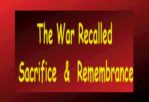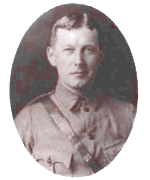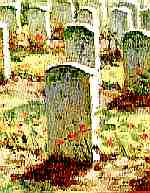THE RED POPPY
|

|
|
Long before the Great War, the red poppy had become a symbol of death, renewal and life. The seeds of the flower can remain dormant in the earth for years, but will blossom spectacularly when the soil is churned. Beginning in late 1914, the fields of Northern France and Flanders became the scene of stupendous disturbances. Red Poppys soon appeared.
In 1915, at a Canadian dressing station north of Ypres on the Essex Farm, an exhausted physician named Lt. Col. John McCrae would take in the view of the poppy strewn Salient and experience a moment of artistic inspiration. The veteran of the South African War was able to distill in a single vision the vitality of the red poppy symbol, his respect for the sacrifice made by his patients and dead comrades, and his intense feeling of obligation to them. McCrae would capture all of this in the most famous single poem of the First World War, In Flanders Fields.
 John McCrae John McCrae
|
The doctor's work achieved immediate universal popularity which was subsequently reinforced by his own death in 1918 from pneumonia and meningitis. He was buried in a military cemetery near Calais on the English Channel, thus becoming one with those of whom he wrote in his famous poem. Probably by the time of his internment, John McCrae's verse had forever bound the image of the Red Poppy to the memory of the Great War.
The poppy was eventually adopted by the British and Canadian Legions as the symbol of remembrance of World War One and a means of raising funds for disabled veterans. An American war volunteer, Moina Michael, helped establish the symbol in the US where the Veterans of Foreign Wars and the American Legion also embraced the Red Poppy tradition.
In Flanders Fields
By John McCrae
In Flanders fields the poppies blow
Between the crosses, row by row,
That mark our place; and in the sky
The larks, still bravely singing, fly
Scarce heard among the guns below.
We are the dead. Short days ago
We lived, felt dawn, saw sunset glow,
Loved, and were loved, and now we lie
In Flanders fields.
Take up our quarrel with the foe;
To you from failing hands we throw
The torch; be yours to hold it high.
If yea break faith with us who die
We shall not sleep, though poppies grow
In Flanders fields.
|
Len Shurtleff, President of the WFA-USA was very generous with advice for this article. Recommended for further reading are:
In Flanders Fields -- The Story of John McCrae, John F. Prescott, 1985.
In Flanders Fields: The Story of the Poem by John McCrae, Granfield and Wilson, A Doubleday Book for Young Readers, 1995. [Source of the images above.]
Visit the one of the best online articles on the Poppy Tradition:
Wear a Poppy and Honor the Dead by Capt. Shemal Fernando.
|

|
For more Legends and Traditions of the
Great War return to the
Contents Page
|
For Great War Society
Membership Information

Click on Icon |
For further information on the events of 1914-1918
visit the homepage of
The Great War Society
|
Additions and comments on these pages may be directed to:
Michael E. Hanlon
(medwardh@hotmail.com)
Original artwork & copy; © 1998-2000, TGWS.
|
|
|





